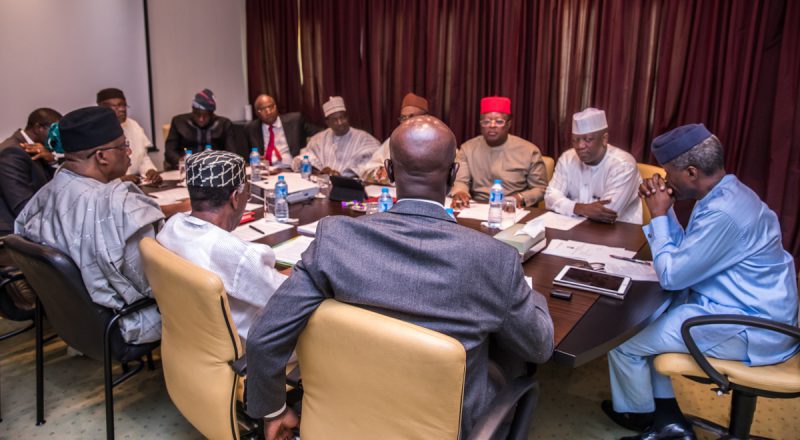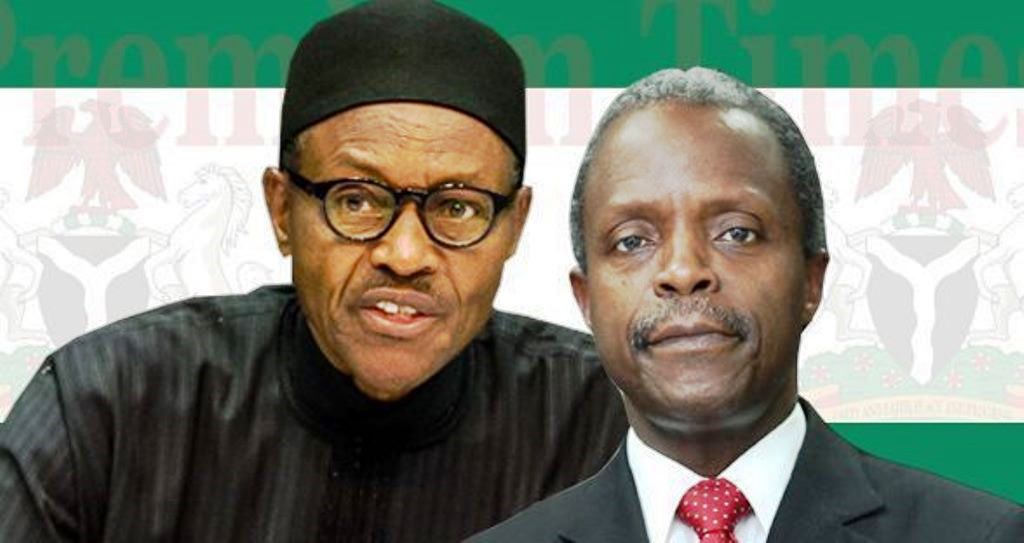Vice President, Prof. Yemi Osinbajo on Thursday recommended the establishment of state police as the effective solution to the current security challenges in Nigeria.
Osinbajo said this at a summit on national security organised by the Senate.
Osinbajo’s pronouncement on state police received spontaneous applause from participants at the summit, where Senate President Bukola Saraki said the government needed the political will to end the violence in the country.
Osinbajo said: “We cannot realistically police a country the size of Nigeria centrally from Abuja. State police and other community policing methods are clearly the way to go.”
He added: “The nature of our security challenges are complex and known. Securing Nigeria’s over 900,000sq km and its 180 million people requires far more men and material than we have at the moment.
“It also requires a continuous reengineering of our security architecture and strategy. This has to be a dynamic process.
“For a country of our size to meet the ‘one policeman to 400 persons’ prescribed by the United Nations would require triple our current police force; far more funding of the police force and far more funding of our military and other security agencies.”
The Vice President added that Nigeria must intensify its collaboration with her neighbours in the Chad Basin by strengthening security, especially at border communities, to prevent the movement of small arms and disarming armed pastoralists and other bandits who go through the borders day after day.
He warned that the country must avoid the danger of allowing the crisis to degenerate into religious or ethnic conflict, which, he said is the responsibility of political, religious and all other facets of the country’s leadership.
On the upsurge of killings, Osinbajo noted that the recent incidents of killings across the country are a reminder that there is no room for complacency in the task of securing Nigeria.
The Vice-President said: “This is against the backdrop of the remarkable improvements we have recorded on the most dreaded security challenge we had at a time – the fight against Boko Haram.
“In 2015 when the Buhari administration came on board, much of the North Eastern Nigeria lay in the shadows of the terrorist group. In two and half years since then, our military has done a remarkable job of reclaiming Nigerian territories, rescuing tens of thousands of civilians and routing the Boko Haram. Today, the group is a shadow of itself and has resorted to suicide bombings and other attacks on soft targets in a desperate attention seeking.
“Boko Haram was by no means the only security challenge that we inherited when we took office 2015. Cattle rustling, pronounced especially in the North West of Nigeria, clashes between farmers and herdsmen in the North Central region; militant activities in the South South and parts of the South West, ethnic agitation in the South East region; there was also the Islamic Movement of Nigeria in Northern Nigeria, increasingly emboldened to challenge the authority of the state.
“I want to say that because of the spread and because of the diversity of these threats, the nation’s security architecture was over stretched as our security became engaged on different battle fronts at the same time.”
Osinbajo noted that in 2017, the Global Terrorism Index reported that deaths by terrorism dropped by 80 per cent in Nigeria.
The Vice President said since the beginning of the year following the killings in Guma, Gwer and Logo local governments in Benue State, the issue of herdsmen and farmers clashes had dominated the public space.
Every Nigerian, he said, is entitled to adequate security from the government for their livelihoods.
His words: “Government fails in that responsibility often, but, I must say, never deliberately. Every killing diminishes us as people; every killing undermines the authority of the state. This is why the saying sometimes that because the President is Fulani he has ignored the killings by herdsmen is both untrue and unfair.
“In any event, the herdsmen and farmer clashes resulting in deaths had been with us for at least two decades and I have been working with him for three years now and I do not know any other issue that has given him more concern or on which he has spent more time than this particular issue?
“What then is being done. The approach of the government has been to deploy more mobile police force to flash points and also, both the Army and Air Force. The Nigeria Army units in Benue State, for example, have consistently maintained Forward Operating Bases at the flash areas in Guma, Logo, Katsina Alla and Agatu LGAs.
“The operation has a genetic name, Operation Zenda . The Army has in the last few days scaled up its personnel and equipment in Agatu, Guma, Katsina Alla and Logo LGAs . The Army has also recently deployed troops to Awe and Tunga LGAs of Nasarawa State in order to monitor and block the gaps in areas believed to have been used as flash points by armed herdsmen to attack communities in Benue State.”
He noted that next week as earlier been announced, the Army will flag off “Exercise Ayan Akpatuma” to checkmate the activities of armed bandits in Benue, Taraba and environs.
In Osinbajo’s view, the security forces have performed creditably – given the resources available to them.
The problem, he noted, is that in some of the worst cases of killings, the security agencies were simply not there in time.
Osinbajo quoted President Buhari to have said over the Benue killings, ”I am a soldier; I have seen death in warfare but the callous killing of innocent people especially women and children is cowardly and despicable in the extreme and it must be prevented or stopped and the perpetrators must be punished.”
He noted that in his statement of commiseration to the Governor of Benue State, President Buhari said: “This is one attack too many, and everything must be done to provide security for the people in our rural communities. I have ordered the security agencies to find and capture the perpetrators, they must face justice.”
The Vice President said that one thread running through all of the security challenges in Nigeria is the proliferation of light arms and small weapons.
“This age-old problem appears to have intensified in recent years on account of the fall of the Libyan Government under Muammar Gaddafi in 2011. These events unleashed large numbers of well-trained fighters, as well as the contents of Gaddafi’s armories,” he said.
On farmers/herders clashes, Osinbajo said with the collaboration of states, and the governors of Benue, Plateau, Adamawa and along with seven other governors, working group had been constituted. He chairs the group, which has been seeking to proffer solutions to some of the problems associated with farmer/herdsmen clashes, but in particular, how to ensure that there is a plan for cattle breeding and rearing, which takes into account, contemporary methods of doing so in other parts of the world.
He noted that also in collaboration with the States and other stakeholders, “we have been developing solutions to the issues of resource scarcity which is at the heart of the conflicts – the increasing competition for grazing land and water heightened by climate change.
“Aside from states that have gazetted grazing areas, so far about 13 states have agreed to allocate 5,000 hectares of land for the ranching or livestock production. We must emphases that in arriving at any of these decisions in the states, the states, Federal Government and all of the stakeholders have to seat together and work out solutions that will benefit everyone. This cannot be done by fear or force, people have to work together to ensure that there is adequate consultations.
Saraki spoke of “these attacks and reprisal attacks”, saying that they are “an intolerable cycle of hell that must be broken”. “Killings, kidnappings, mayhem and general lawlessness cannot be the new normal. We must take this country back and restore order.”
Saraki noted that though there was no doubt that Nigerians possessed the capacity to change the narrative, to end the violence and bring succor, what is required is the political will.
The Senate President said: “The coming together of the Executive and Legislative arms of government for this discussion about security is a pointer to the seriousness of the situation, and our determination to tackle the problem. The summit is also unique, because never before have we had such an inclusive platform for appraising security-related matters in this country.”
”It was envisaged that the summit would provide a platform for critically examining the problem of insecurity, to help collate views and ideas in aid of the search for solutions. It is most reassuring to see us all here – people together – coming together to come up with a national response to a grave problem confronting our nation.
“To the Executive, I say this: you cannot do it alone – and this is why we are all here to join efforts. It is all hands on deck. No one person, organisation or arm of government can single-handedly tackle the hydra-headed monster of insecurity. The Constitution makes it clear that the safety of lives and property of citizens is the responsibility of government. We in government must therefore do everything in our power to ensure that Nigerians are safe from harm, and their livelihoods and belongings protected.
“Permit me to observe that those who are in this room have the capacity to bring about a change in this situation, to end the violence and bring succour. We have the capacity. But, do we have the political will? I daresay political will is what is required; and it is my hope that we shall marshal it as a legitimate instrument against this problem. Indeed, there is no reason why that should not be the case. This is not a summit to trade blames – in no way is this a blame game. Neither is it convened so that any person or entity can take credit. We just want solutions. Solutions only. That is all Nigerians require of us.
“It is expected that at the end of our deliberations and submissions, we will have a more profound understanding of the nature of the crisis; as well as a realistic assessment of the strengths and weaknesses of our security assets. We should also have a more accurate assessment of challenges to the current disposition of the Nigerian state – through the level of preparedness of all its law and order agencies to security threats.”



